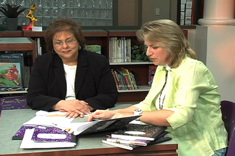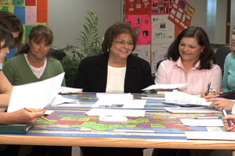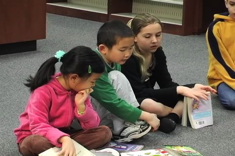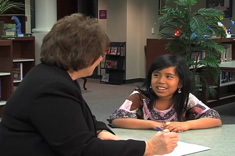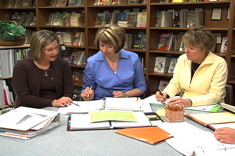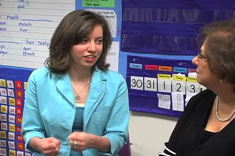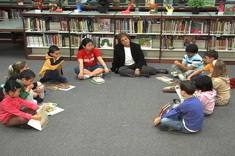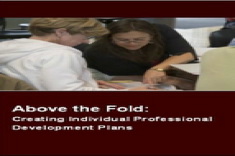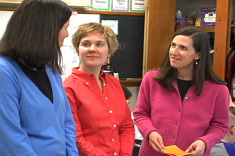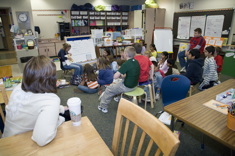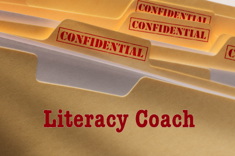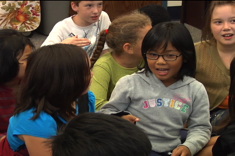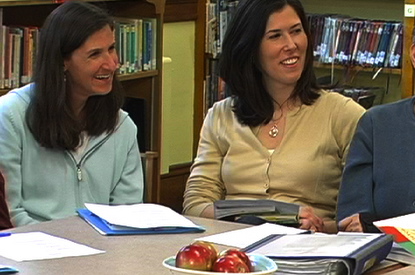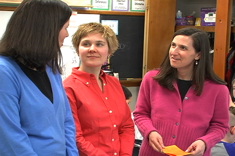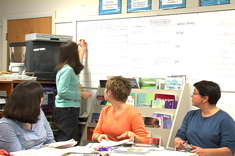Leadership
Do you guide teachers, specialists, and literacy coaches? Here are tools, advice, and strategies school leaders need for their daily work in staff meetings, study groups, and one-on-one discussions with colleagues. If you have a leadership role in coaching teachers and designing professional development, you'll want an upgraded membership with access to our Leaders Lounge.
Latest Content
Teacher/Principal Conferring: Reflecting on Readers’ Notebooks
In this conference, Principal Karen Szymusiak and 5th grade teacher Liz Cramer discuss the ways Liz uses readers’ notebooks in her classroom.
The Conversations Inspired by the Questions We Ask
Principal Karen Szymusiak shares her reflections and questions that cause her teachers to question their current practice and lead them to consider authenticity in reading instruction.
Solving Problems Quote Collection
If you need reminders that every problem is an opportunity, check out this stellar quote collection.
Open Book Clubs
Shari Frost shares the nuts and bolts of setting up open book clubs in your school. These clubs are a great way to expand the reading community, as well as connect school libraries and classrooms.
Student Reading Interview: Assessing Ana
Principal Karen Szymusiak interviews Ana, a second grader, to learn more about her strengths and needs as a reader.
Case Studies in Professional Learning Communities
In this brief video, Literacy Coach Pam Hahlen and Principal Karen Szymusiak meet with two teachers in a professional learning community group to discuss ongoing case studies.
Data Cards: Assessment Profiles at a Glance
“Data cards” are ingeniously designed to allow an entire grade-level team to look at the reading levels of all students in the grade. In this four-minute video, “The Sisters” (Gail Boushey and Joan Moser) explain how they work.
Chatting About Coaching Collaboration
Gail Boushey and Janet Scott discuss how they collaborate as coaches, sharing strategies and common goals across the classrooms they work in.
Literacy Chats: An Open Discussion Format
Literacy coach Pam Hahlen discusses the value and format of monthly “literacy chats” for teachers.
Talking About Synthesis: Metaphors from 2nd Graders
In this remarkable discussion, Lauren Scott's second-grade students chat with their teacher and Principal Karen Szymusiak about metaphors for synthesis.
Tiger Teams: Mixed Age Student Groups
In this video, Karen Szymusiak (the principal at Glacier Ridge Elementary School in Dublin, Ohio) explains how “Tiger Teams” work. Tiger Teams are mixed age groups of K-5 students who meet regularly to talk about their learning and the school community.
Collaborative Team Meeting: Assessing and Planning Together
Gail Boushey leads a collaborative planning meeting between 4th grade teachers, literacy coaches, and the principal early in the year.
Quick Take: Protocols for Teacher Study Groups
In this three-minute Quick Take video, Clare Landrigan describes the teacher study group protocol she uses to foster shared understanding and allow for differentiated learning among teachers.
On Kidney Tables: Small Changes for Big Effects
When our environment aligns with our values, Karen Szymusiak considers what helps learners take charge of their experience in a successful learning community.
Above the Fold: Creating Individual Professional Development Plans (E-GUIDE)
Determine importance for yourself using a six-step process that individualizes a plan to help you set limits, study deeply and lead the scholarly life you deserve.
Charting the Course: A Yearlong Professional Development Plan for New Teachers (SCHEDULE)
Planning with the end in mind is essential for literacy leaders. Jennifer Allen takes us through her process for creating a focused and progressive year-long plan.
The Curricular Support Menu: A Collaborative Tool for Assisting Colleagues
This support menu is a fun way for literacy coaches to survey teachers for support requests.
Literacy Room for Teachers Tour
In this four-minute video tour, Jennifer Allen describes how she arranges and displays materials in the “Literacy Room,” the space that has become invaluable in supporting teachers’ professional development in literacy instruction.
What’s Valued? Exploring Different Values in Evaluation (E-GUIDE)
Brenda Power shares a workshop series designed to help educators bring their values into closer alignment for a more cohesive experience for students.
Three Little Phrases No Literacy Coach Can Live Without
Brenda Power shares trade secret phrases for communicating with colleagues.
Launching Teacher Study Groups: Guidelines and Resources
Jennifer Allen’s years of experience with teacher study groups has led her to best practices that make it “safe and easy” for teachers to learn from each other.
Under, Over and Beyond Words: Strategies for Observing Talk in Classrooms
This article offers possibilities for observing classrooms focused on talk as an alternative to traditional observation notes.
We Are All Shamu: What Literacy Leaders Can Learn from Exotic Animal Trainers
If you've ever compared your classroom to a zoo, this article by Brenda Power is for you. You'll take animal trainer advice like "We change behavior in others by breaking routines in delightful ways" and follow it into the classroom.
Literacy Coach Confidential: What Can I Do About Poor Attendance at My Study Group?
When attendance drops in study groups, here are some ways to get it back on track (or take a new direction entirely).
The Other Buddy: How Partnership Programs Help Older Readers
In many buddy reading programs we often tout the benefits for the younger, less experienced reader, but Shari Frost tells the story of a “big kid” reader with a legitimate reason to read books that were closer to his independent level. Read on.
Boosting Attendance at Study Groups
Brenda Power shares advice from teachers that are building and maintaining inquiry study groups with adults.
Collaborative Teaching: Finding Common Ground First
These are important questions for teachers entering into a co-teaching situation to consider in advance.
Literacy Coach Confidential: Teachers Resent Me – What Can I Do?
We address the issue of resentment by considering how leaders can stay optimistic and use questions to open up a discussion.
Keeping It Simple: Reflections on the December New Teachers Study Group
What is really important for our time and energy? Jennifer Allen reflects on words of wisdom that keep her centered as a literacy coach.
Planning a New Teachers’ Professional Development Program
Jennifer Allen maximizes resources as she plans for a monthly professional development group for new teachers.
Browse Content By
Type
Category
- Assessment Tools
- Big Fresh Archives
- Booklists
- Choice Numeracy
- Classroom Design
- Common Core
- Community Building
- Conferring
- Content Literacy
- Digital Literacy
- English Language Learners
- Equity
- Family Relations
- Free Samples
- Guiding Groups
- Leadership
- Literacy Coaches
- Mentor Texts
- Minilessons
- New Teacher Mentors
- Podcasts
- Poetry
- Quote Collections
- Reading Strategies
- Self Care
- Struggling and Striving Learners
- Talking and Listening
- Teacher Study Groups
- Teaching Reading
- Teaching Writing
- Word Study and Vocabulary
Author
- Melissa Quimby
- Nawal Qarooni
- Gwen Blumberg
- Julie Cox
- The Lead Learners
- Hannah Tills
- Josie Stewart
- Ruth Metcalfe
- Mallory Messenger
- Becca Burk
- Jodie Bailey
- Vivian Chen
- Mary Brower
- Tiffany Abbott Fuller
- Stephanie Affinito
- Ruth Ayres
- Leigh Anne Eck
- Heather Fisher
- Shari Frost
- Julie Johnson
- Suzy Kaback
- Gigi McAllister
- Shirl McPhillips
- Melanie Meehan
- Cathy Mere
- Debbie Miller
- Tara Barnett and Kate Mills
- Tammy Mulligan
- Dana Murphy
- Bitsy Parks
- David Pittman
- Brenda Power
- Heather Rader
- Matt Renwick
- Mandy Robek
- Christy Rush-Levine
- Gretchen Schroeder
- Jen Schwanke
- Brian Sepe
- Katherine Sokolowski
- Stella Villalba
- Jennifer Vincent
Grade Level
Choice Literacy Membership
Articles
Get full access to all Choice Literacy article content
Videos
Get full access to all Choice Literacy video content
Courses
Access Choice Literacy course curriculum and training

